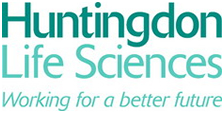Huntingdon Life Sciences facts for kids
 |
|
| Industry | Pharmaceutical industry |
|---|---|
| Fate | Merged into Envigo (now Inotiv) |
| Successor | Inotiv |
| Founded | 1951 in Cambridgeshire, England |
| Headquarters | East Millstone, New Jersey |
|
Area served
|
Global |
|
Key people
|
Brian Cass, Former Managing Director |
| Services | Contract research organization |
| Revenue | $242 million |
|
Operating income
|
$35 million |
| $10 million | |
| Total assets | $171 million |
| Total equity | -$15 million |
|
Number of employees
|
>1,600 |
Huntingdon Life Sciences (HLS) was a company that helped other businesses, especially those making medicines. It was founded in England in 1951. HLS had laboratories in the United Kingdom and the United States. It was one of the biggest companies in Europe doing this kind of research. In September 2015, HLS joined with other companies like Harlan Laboratories to form Envigo, which is now called Inotiv.
HLS offered services to check the safety of new products. This included testing new medicines before they were used by people. They also worked with companies that made products for farming, like crop protection.
HLS had two main locations in the UK: Huntingdon and Eye, Suffolk. They also had a lab in the USA in East Millstone, New Jersey, and an office in Tokyo, Japan.
The company was known for using animals in its research. Because of this, some groups criticized HLS for its animal testing practices. A group called Stop Huntingdon Animal Cruelty was formed. Their goal was to try and shut down the company due to concerns about animal rights.
Contents
History of Huntingdon Life Sciences
Huntingdon Life Sciences started in the UK in 1951. It was first called Nutrition Research Co. Ltd. The company initially focused on research about nutrition and animal health. Its first offices were in Huntingdon, England. The main labs were nearby.
Later, the company began working with medicines, food additives, and other chemicals. In 1959, its name changed to Nutritional Research Unit Ltd. In the early 1960s, more government rules for testing new products helped the company grow. In 1964, a company called Becton Dickinson bought it.
Growing the Company
In 1983, Becton Dickinson created Huntingdon Research Centre PLC. They sold parts of the company to investors. In 1985, as the company grew, its name changed to Huntingdon International Holdings plc. That same year, they started Huntingdon Analytical Services Inc. to work in the United States.
Huntingdon bought several other testing companies in the US during the late 1980s and early 1990s. This helped them expand their services. They also tried to get involved in engineering and environmental services.
In 1988, HLS became a public company. Its shares were traded on the London Stock Exchange and the New York Stock Exchange.
Focusing on Life Sciences
By the early 1990s, Huntingdon had different business groups. However, only the Life Sciences Group showed good long-term potential. So, in 1995, they sold off their engineering and environmental businesses.
To make their life sciences business stronger, Huntingdon bought a toxicology business in 1995. This deal included a lab in the US near Princeton, New Jersey, and two facilities in Britain. In 1997, Huntingdon International Holdings changed its name to Huntingdon Life Sciences Group. The UK part became Huntingdon Life Sciences, and the US part was Huntingdon Life Sciences Inc.
In 2002, HLS moved its financial base to the United States. It became a company in Maryland called Life Sciences Research. In 2009, HLS was acquired by another company.
Finally, in September 2015, Huntingdon Life Sciences merged with several other companies. They all became part of Envigo, which is now known as Inotiv.
Staff Numbers at HLS
In 2008, Huntingdon Life Sciences had more than 1,600 employees. Here is how the staff numbers were divided:
| 2008 | 2007 | |
|---|---|---|
| UK | 1,303 | 1,313 |
| US | 333 | 309 |
| Japan | 12 | 12 |
| Total | 1,648 | 1,634 |
Groups HLS Belonged To
HLS was a member of several important industry groups and associations. These groups help set standards and share knowledge in the scientific and pharmaceutical fields. Some of them include:
- Association of the British Pharmaceutical Industry (ABPI)
- Bioindustry Association (BIA)
- Association for Assessment and Accreditation of Laboratory Animal Care (AAALAC)
- Society of Environmental Toxicology and Chemistry (SETAC)
- Fund for the Replacement of Animals in Medical Experiments (FRAME)
- Institute of Animal Technology (IAT)
- Understanding Animal Research (UAR)
Awards and Recognition
Huntingdon Life Sciences received some awards for its work:
- Agrow Awards Best Supporting Role in 2007
- Queens Award for Export Achievement in 1982
Use of Animals in Research
HLS used animals for the biomedical research it did for its clients. The company reported that around 60,000 animals were used each year in the UK. This table shows the types of animals used and how much they were used:
| Animal | Usage |
|---|---|
| Mouse | 19.25% |
| Fish | 3.45% |
| Rat | 71.05% |
| Bird | 0.92% |
| Other mammals | 5.31% |
See also
 In Spanish: Huntingdon Life Sciences para niños
In Spanish: Huntingdon Life Sciences para niños
 | Lonnie Johnson |
 | Granville Woods |
 | Lewis Howard Latimer |
 | James West |

